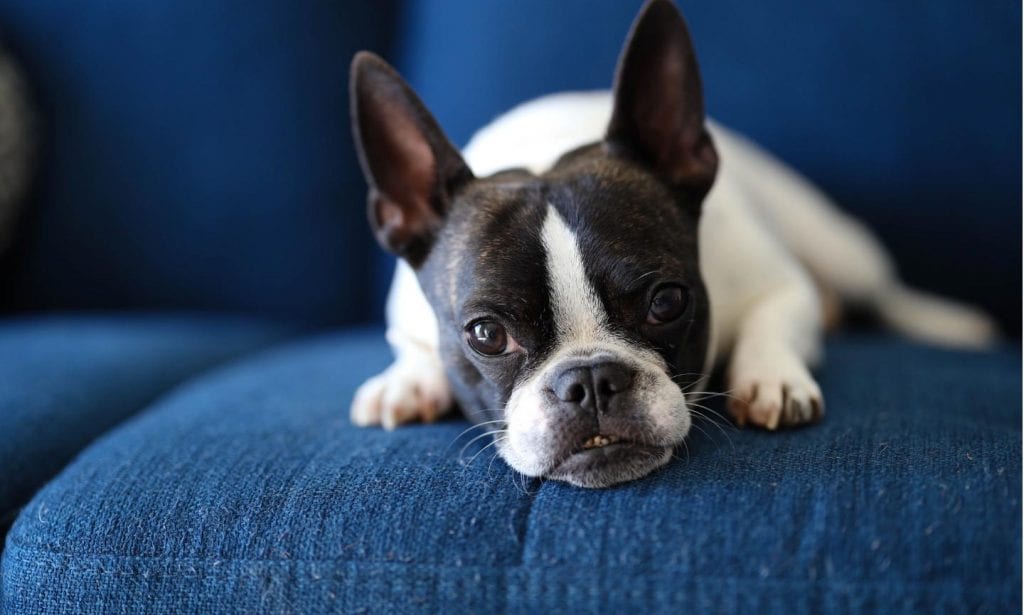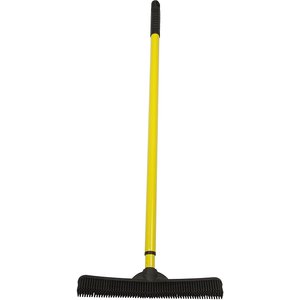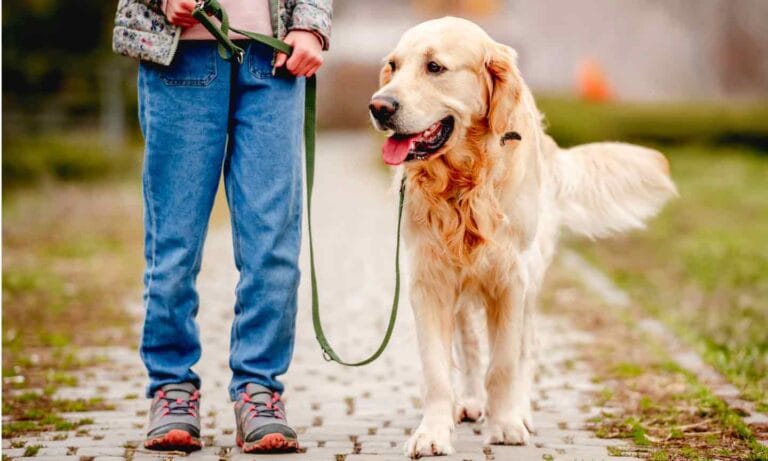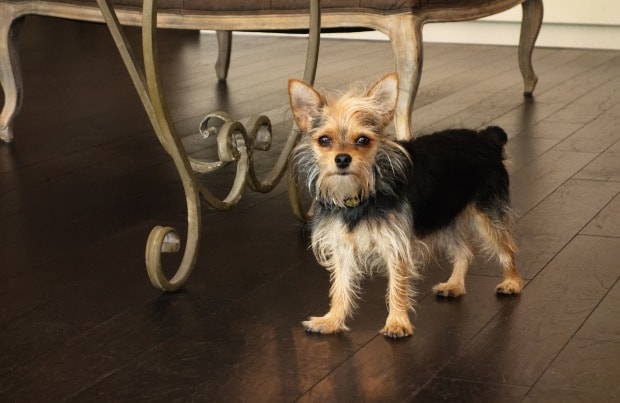So you want to adopt a dog—but you don’t want your whole home to be covered in fur. Maybe you even have allergic reactions that are triggered by dog hair. Here’s the good news: You can have your pup and a fur-free home, too, as long as you adopt a low-shedding dog.
While all dogs shed (even the so-called hairless dogs), some are more prone to let the fur fly than others. So whether you’re trying to avoid sneezing fits or extra vacuuming (or both), this list of low-shedding dogs is for you.
In This Guide
Hypoallergenic Dogs: Do They Exist?
Let’s start with a reality check: There is no such thing as a completely non-shedding dog—even so-called hairless breeds. Like humans, all dogs shed at least a little hair at one time or another. Because dog hair can trigger allergic reactions in humans, that means that truly hypoallergenic dog breeds do not exist.
Even if there was a dog breed that didn’t shed at all, they still wouldn’t be hypoallergenic. That’s because most dog allergies are caused by dog dander, not the hair they shed. Dander is the dead skin that falls off the dog, depositing itself all over the house and wafting through the air into your nose and eyes in the process. All dogs produce dander, but some dogs create a lot less dander. Low-shedding dog breeds are considered to be best for allergy sufferers, which means they don’t produce as many allergens through flaky dead skin and dander as other breeds do.
So, which dogs shed less? Read on to learn more about 25 low-shedding breeds.
25 Dog Breeds That Don’t Shed (Much)

1 Bichon Frise
While completely non-shedding dogs are impossible to come by, the Bichon comes very close with their curled double coat. They’re active, playful dogs that have a cheerful disposition and are compatible with allergy sufferers. They do, however, require daily brushing and combing to keep their coats healthy and mat-free.
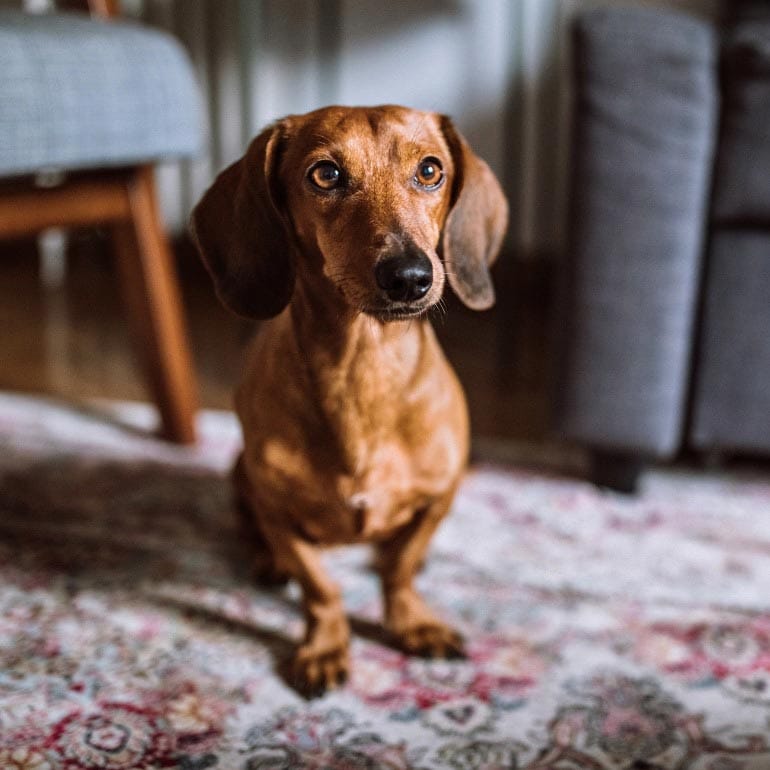
2 Dachshund
Known for their long bodies and short legs, smooth and wirehaired Daschunds are light shedders with a loveable and playful disposition. Their small size makes them a great dog for apartment living and with the appropriate supervision can be an ideal pet for owners with children. It’s no wonder they’re one of the most popular dog breeds, according to the AKC!

3 Poodle
This high-energy, intelligent breed is a great choice for allergy sufferers but will need regular, professional grooming to maintain their coat. All three Poodle breed varieties, the standard, miniature and toy, come in various colors including white, black, apricot and gray and make excellent companions.

4 Portuguese Water Dog
Known for their strength and spirit, the Portuguese Water Dog has a coat that’s both waterproof and low-shedding. It can be either curly or wavy and requires monthly groomer's visits and daily brushing to prevent mats. These dogs make loyal companions, but are an active and athletic breed that requires regular, vigorous exercise to stay fit and happy.

5 Standard Schnauzer
While they don’t shed regularly as much as other breeds might, Standard Schnauzers do require their body coats to be hand-stripped—a term for removing loose, dead hair with a special knife—at least twice a year. Their beard and leg hair requires regular brushing to prevent mats. Schnauzers are social and affectionate and are especially good with children, but their strong-willed nature requires a stern hand in training.
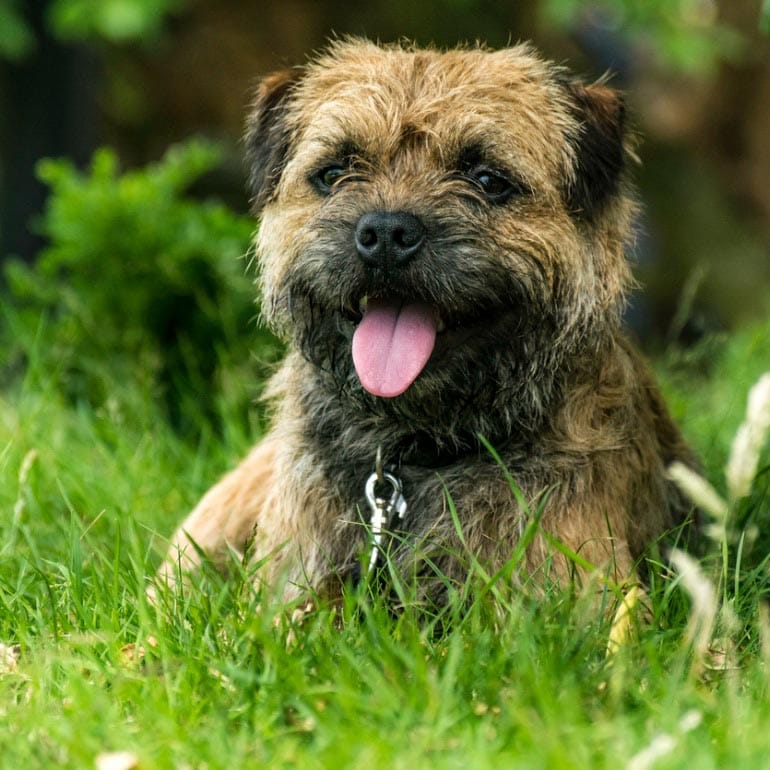
6 Border Terrier
A working terrier breed known for their persistence and alertness in the field, Border Terriers make affectionate and very trainable pets. Their active nature requires regular exercise while their weather resistant coats require only an occasional brushing and hand stripping twice a year.

7 Maltese
A toy breed easily recognized by its long, silky white hair, Maltese are brave and gentle. A great family dog that has a big personality for such a small body, they do require daily brushing and regular grooming to prevent matting in their long coats.

8 Coton de Tulear
If you love snuggling with your dog as much as you dislike being covered in fur, the Coton de Tulear is your breed. These loving dogs have never heard of personal space—they want to be by your side 24/7! But while they aren’t likely to leave their hair laying around, they will need daily brushing to prevent mats from forming in their characteristic white fur.
Find out all about it in our guide to the Coton de Tulear dog breed.

9 Bolognese
Another small, fluffy, white breed, Bolognese dogs have two big things going for them in the fur department: They’re low-shedding and relatively low-maintenance. Their silky white coat can be trimmed for easier grooming, and if you give them a good brushing once per day, you’ll prevent mats and keep them looking their best. Not too shabby for a calm yet playful furry friend to add to your family!

10 Lhasa Apso
You might not expect a dog with long, flowing locks to be a low-shedding breed, but that’s exactly what you get with a Lhasa Apso. Yes, their dense double coat does need regular brushing and trimming to prevent tangles, but they’ll reward that attention by being the perfect lap dog for as long as you want them beside you. Just be prepared to give them the royal treatment—these dogs were originally raised in Tibetan palaces and monasteries, after all!
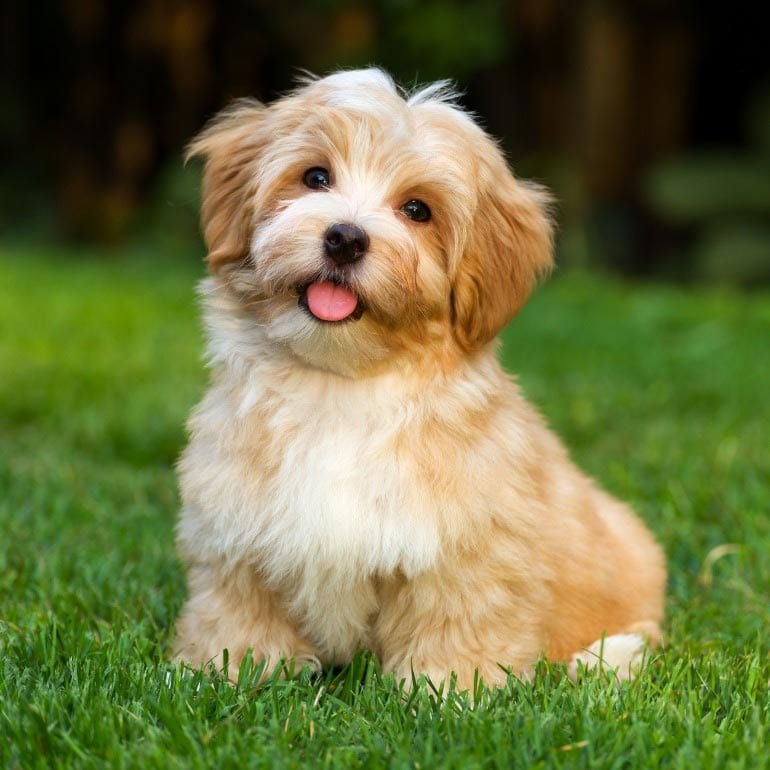
11 Havanese
Another breed with locks that can grow long, Havanese pups are nonetheless pretty minor on the shedding side. Their double coat can be clipped short if you’re able to take them to the groomer for regular haircuts; if you let it grow long, they’ll need daily brushing to prevent tangles. You (or your groomer) can even pull the hair on their head up into a high ponytail—not only is it on trend, but it also helps keep their hair out of their eyes.
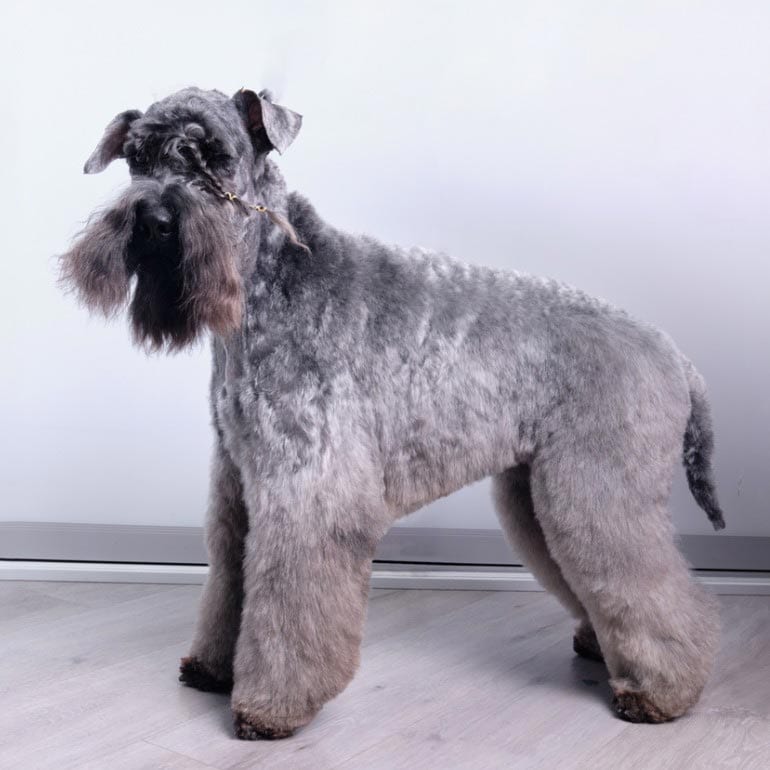
12 Kerry Blue Terrier
Here’s the good news: Kerry Blue Terriers aren’t big on shedding. But the tradeoff is that the breed is relatively high maintenance, grooming-wise. Plan to set aside some time every week to brush and comb their fur well to prevent mats and tangles from forming, as well as to trim their head, neck, ears and belly fur with scissors or electric clippers. (It’s a good idea to get some tips from a groomer before you try it yourself.) On the upside, those grooming sessions are a great time to bond with your pup!
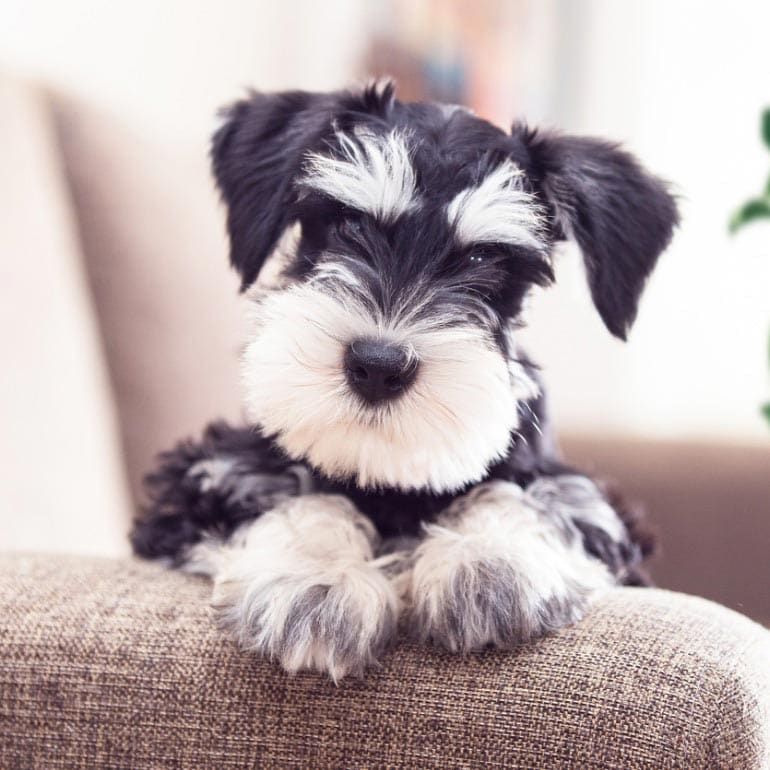
13 Miniature Schnauzer
These friendly, energetic pups bring a ton of personality to the party—and they won’t leave a ton of dog hair behind. Just be prepared to make time for trips to the groomer every four to six weeks, plus baths at home a few times a month and brushing with a slicker brush every day. Like their Standard Schnauzer brethren, show dogs require hand stripping, but if you’re not showing your dog, you can have the groomer take care of the coat with clippers.

14 Basenji
Not into grooming? The Basenji might be a good fit for you. This low-maintenance breed needs just a quick go-over with a rubber curry or boar bristle brush once per week (though you might want to increase the frequency during during the spring and fall shedding seasons). Plus, their short coats naturally stay cleaner than other breeds, meaning bathtime doesn’t have to be a regular thing (plan on twice per year).
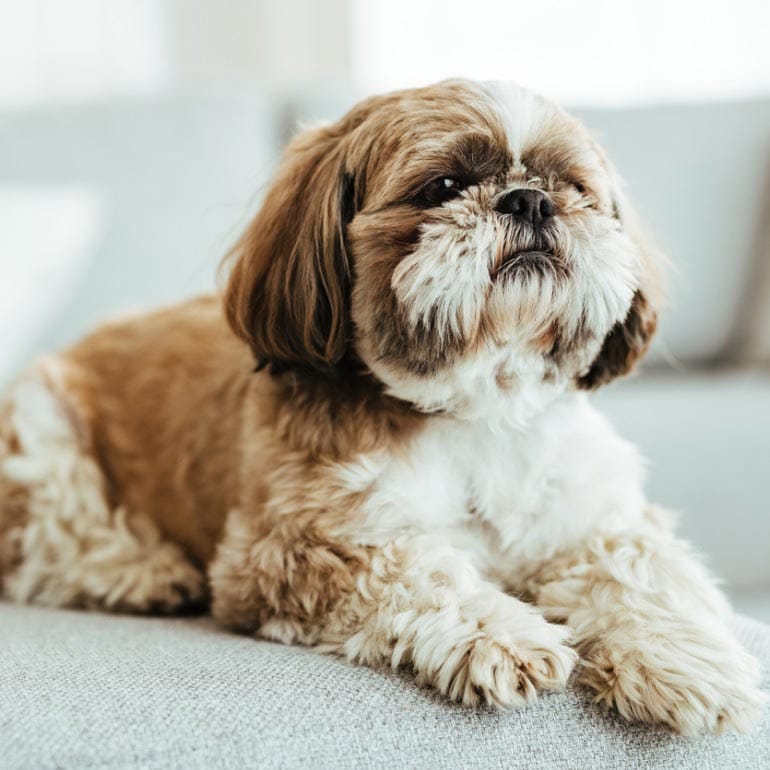
15 Shih Tzu
Another long-haired breed that’s surprisingly low-shedding, the Shih Tzu has a couple different options when it comes to grooming. You can trim their hair short (about one to two inches all over), and plan to brush their coat about once every other day. Or you can go full glam and let that long hair flow—but plan for daily brushing. Either way, you’ll have a loving, personality-packed pup by your side.
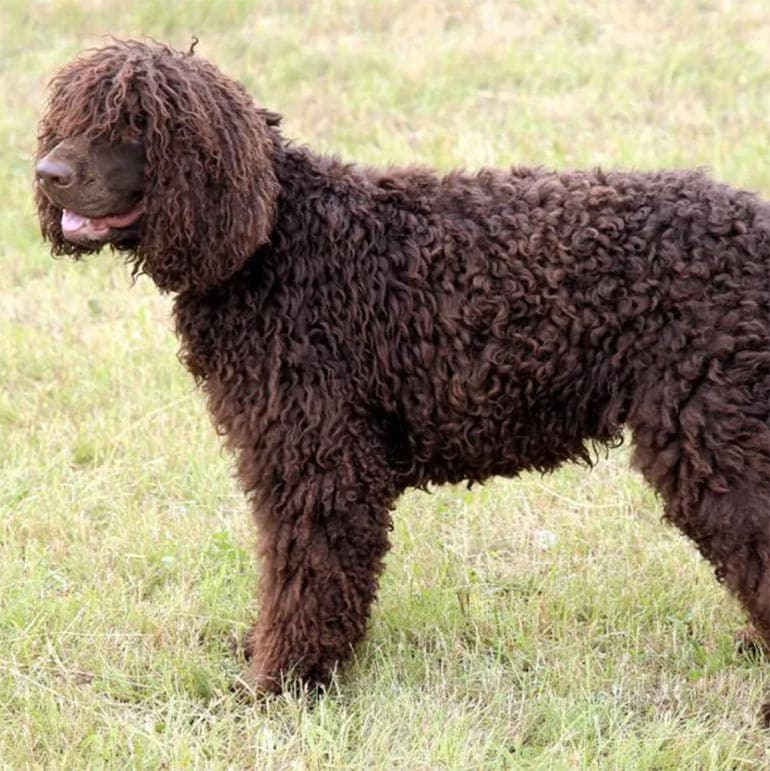
16 Irish Water Spaniel
Irish Water Spaniels’ signature curly coat won’t leave hair tumbleweeds rolling around your home. Grooming can take some extra effort, with a three-step brushing routine at least once per week. But this intelligent, hard-working breed is more than worth the effort, especially if you’re into dog sports or other high-energy activities.
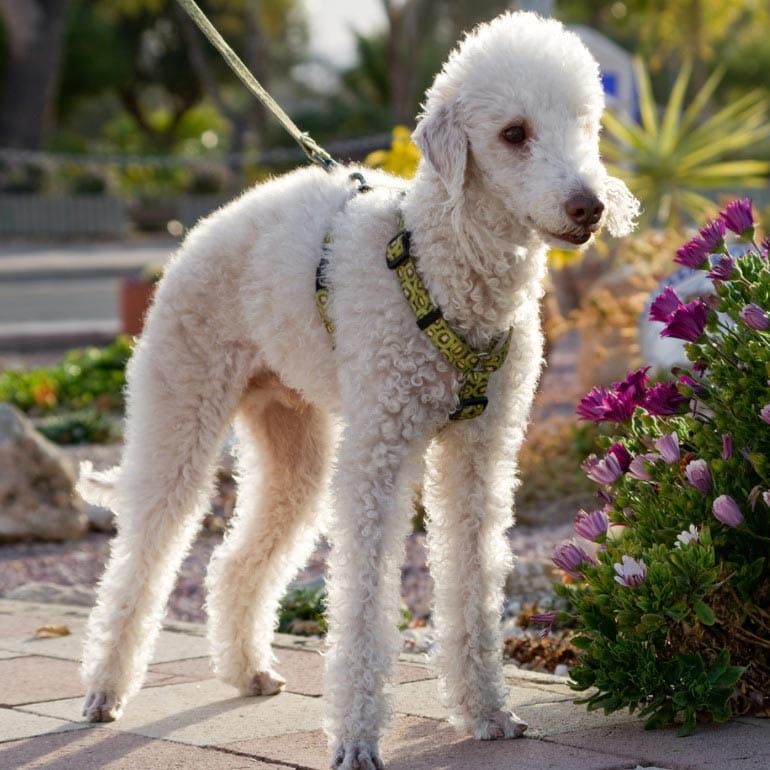
17 Bedlington Terrier
No, that’s not a lamb—it’s a Bedlington Terrier, another low-shedding dog breed. This medium sized dog has a thick, curly coat that requires daily brushing and monthly haircuts. But on the upside, you won’t need to spend extra time cleaning fur around your home. The breed is also known for being smart, easy to train and sweet as, well, a lamb.
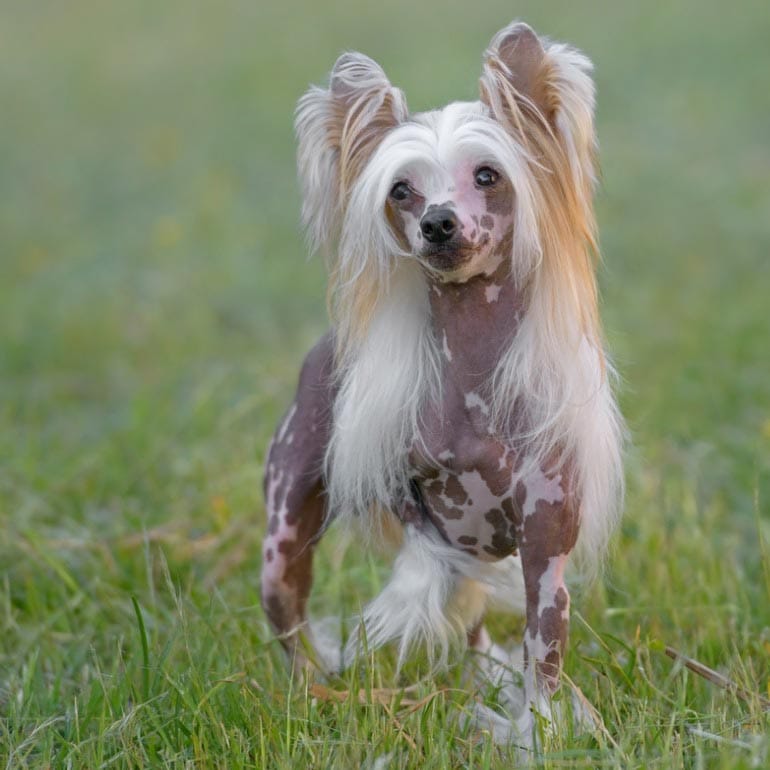
18 Chinese Crested
It makes sense that the Chinese Crested is a low-shedding breed—after all, they’re usually practically hairless! Their soft, silky coat grows mainly on their head, tail, feet and ankles, and the amount of grooming they require depends on whether you have a powderpuff variety (which has a double coat that requires a little more effort) or the standard hairless, which needs less care for their coat but a little more for their bare skin.
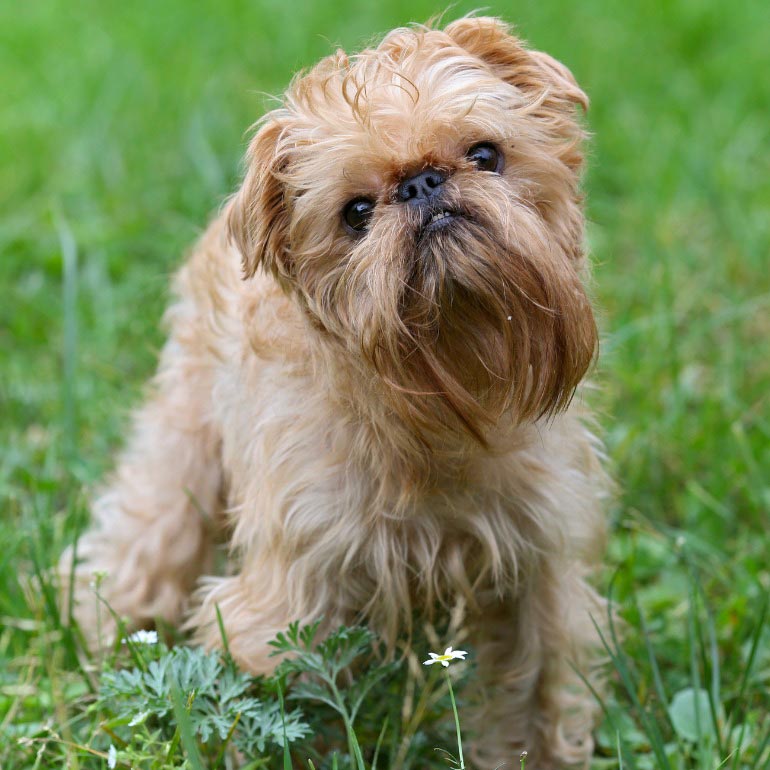
19 Brussels Griffon
These dogs are known for their big eyes and even bigger hearts, but when it comes to fur, their shedding level matches their stature: tiny. Grooming depends on whether you have a rough-coated Griffon (which requires hand-stripping every three months in addition to twice-weekly brushing) or a smooth-coated Griffon (who can skip the hand-stripping). You’ll also want to pay attention to their signature beard, using a comb for detangling and removing any debris. Not that that’s a chore—it’s one of their cutest features, after all!
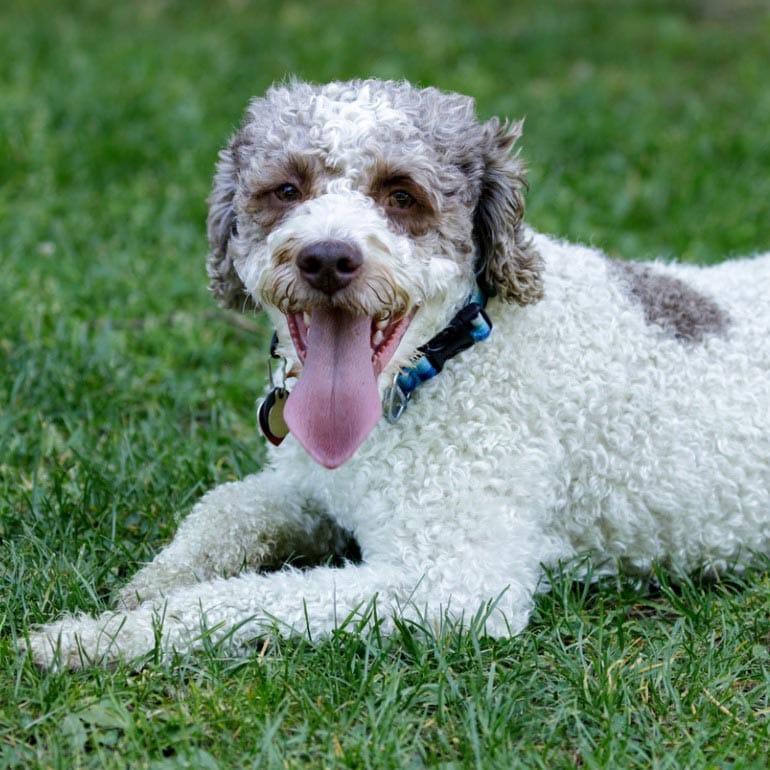
20 Lagotto Romagnolo
These fiesty pups bring plenty of energy to the table—but thankfully, they won’t leave a ton of fur on your furniture. Their curly coats need a trim about every 10 to 12 weeks, and unlike many other curly-haired pups, they don’t need regular brushing. (It can turn their defined curls into a fluffy mess.) Instead, you’ll spend your time with these high-energy dogs being active in the great outdoors.
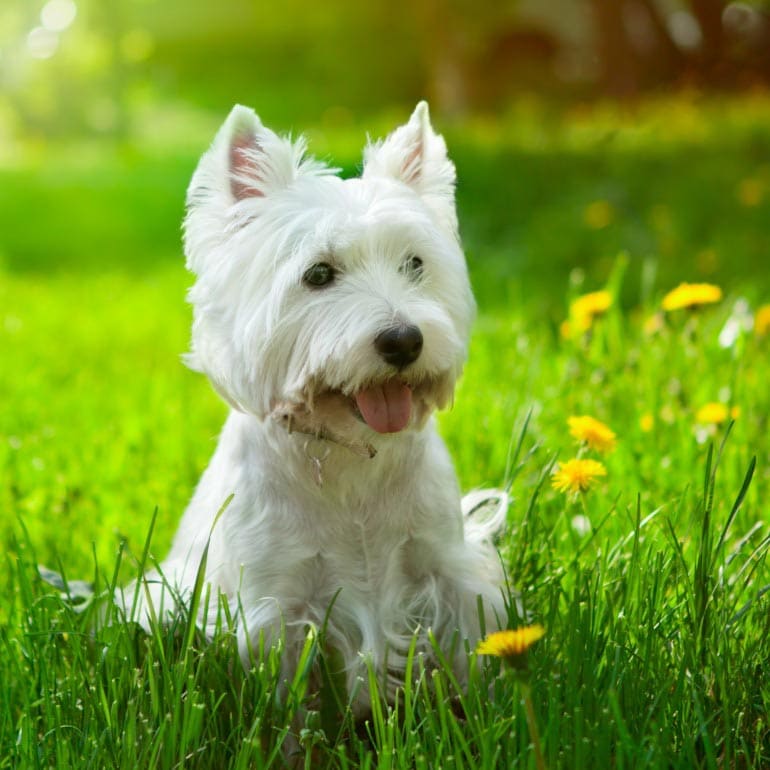
21 West Highland White Terrier
More commonly known as Westies, the West Highland White Terrier’s super-sized personality will bring a smile to your face—and their low-shedding coat will keep allergy sufferers and vacuum-averse pet parents happy, too. If you want that quintessential Westie hairstyle, though—the one with fluffy fur around the legs and shorter on the back and tail with fluffy facial hair—plan to visit the groomer every four to six weeks.
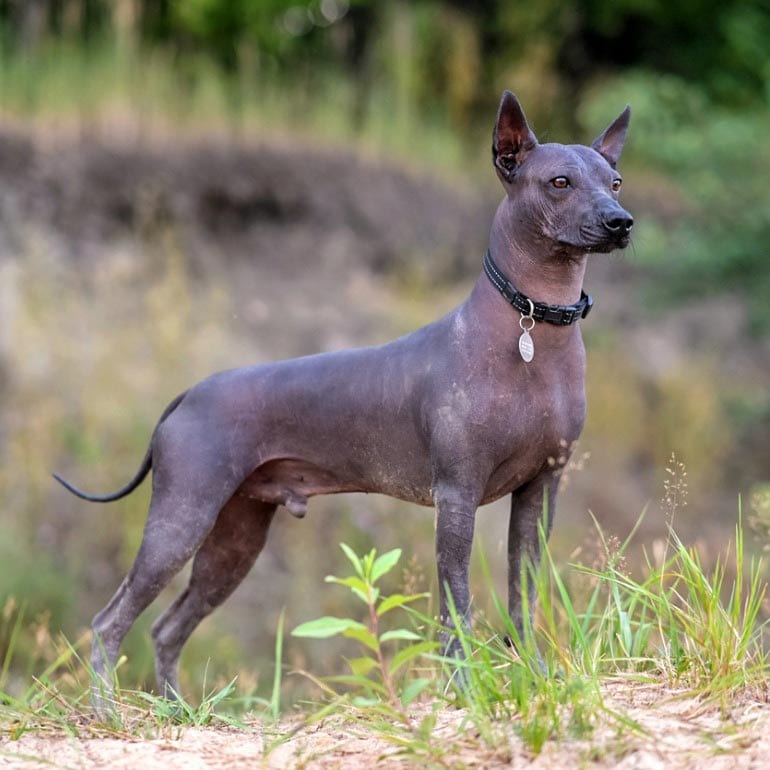
22 Xoloitzcuintli
You’re pretty much guaranteed a fur-free home with a Xoloitzcuintli—as a hairless breed, they don’t have much fur to leave laying around! For obvious reasons, they don’t need brushing; instead, you’ll care for their skin with a bath every couple weeks, regular wipe-downs with a damp cloth between, and lotion to prevent ashy, dry skin. That’s just the beginning of the activities you’ll do together, because these dogs want to be by your side 24/7.

23 French Bulldog
There are plenty of reasons to love Frenchies, as the French Bulldog is often nicknamed: that smooshy face, those perky bat ears and, of course, a short coat that’s low on shedding. While they don’t need regular brushing, you should plan to devote some time each day to cleaning those cute facial folds. Yes, these dogs can have a headstrong (dare we say stubborn?) streak, but they’re also fiercely loyal pups who’ll be by your side through it all.

24 Beagle
Beagles’ short coats don’t need much in the way of grooming, with regular brushing necessary only during the spring and fall. And that’s a good thing, because you’ll be busy with these active, intelligent dogs who love a challenge. Keep them busy with high-energy pursuits like agility training or scent work, or they might just let you know they’re bored with a characteristic “bay” (a cross between a bark and a howl).
We’ve got everything you need to know about the Beagle dog breed here.
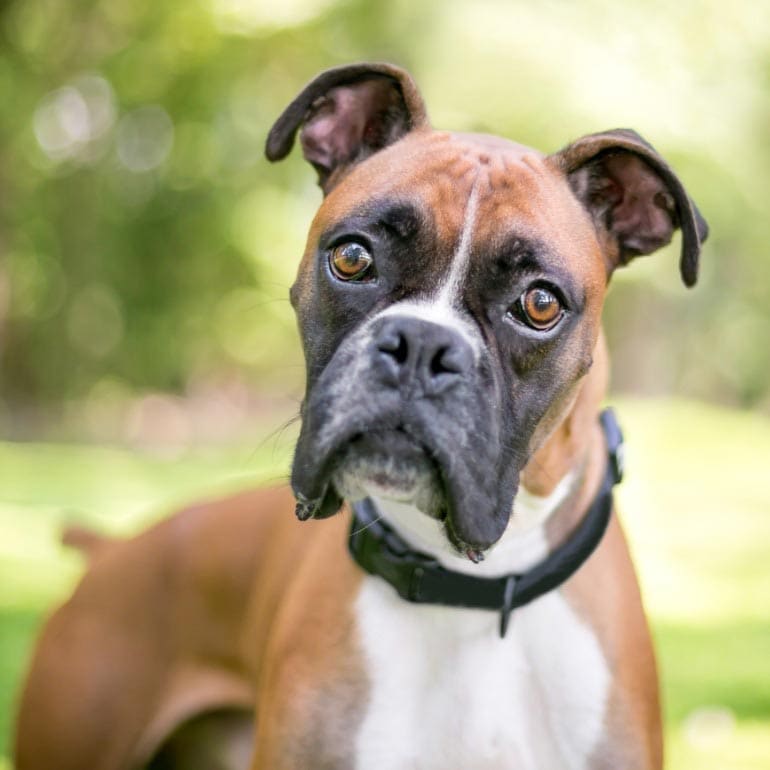
25 Boxer
Boxers are another relatively low-shedding breed, especially if you maintain a regular brushing routine (a few times a week using a rubber curry brush or a hound glove). And while their muscular appearance might initially look intimidating, don’t be fooled: These dogs are silly, playful and extremely loyal.
Tips for Handling Dog Hair
Even for low shedding breeds, hair control can be a maintenance issue. If you do fall head over heels with a dog who sheds, or there are some things you can do to manage the situation.
- Regular brushing is the key—the hair will end up in your dog brush rather than on the carpet, the couch and your clothes. Ask your groomer or look up your dog’s breed to find the best type of brush or comb for your pup.
- Vacuum your floors and furniture frequently, using a machine with a HEPA (high-efficiency particulate arresting) filter. Pet-specific vacuums can help trap allergens and capture loose dog hair from around your home.
- Keep at least one room of the house dog-free. Your bedroom is a good choice, but this may take training and willpower if your pet has gotten used to sleeping with you!
- Fit your home with a central air purifier that uses a HEPA filter and use it at least four hours a day to remove allergens.
- Clean your dog’s dog bedding frequently.
- Wash clothes you wear while interacting with your dog before putting them back in the closet or bureau drawer.
- Limit the number of rugs, upholstered furniture, and drapes in your home. Opt for hardwood floors rather than wall-to-wall carpeting.
- Bathe your dog regularly and brush or comb them daily, outdoors if possible.
- Always wash your hands after touching your dog and avoid touching your eyes and face until you do.
Dog Grooming 101
Need some extra tips and tricks for grooming your dog? BeChewy's grooming guide has you covered! Don’t forget to stock up on the gear you’ll need, too:
Like this story? Check out more of our favorite reads:
Share:
